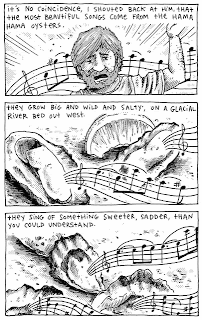Let's take a look at a big batch of minicomics from the talented L.Nichols.
Flocks (Chapter One) was published through Box Brown's Retrofit Comics, and as such, it's the most straightforward of these comics. Flocks was done in Nichols' most naturalistic style, with the exception of how she portrays herself. As always, she is a rag doll with x-button eyes. This is a heartbreaking account of Nichols' upbringing in the South as a devout Christian who knew from a very young age that she was a lesbian. What's remarkable about this story is not that Nichols felt like a freak and an outcast, but that she doubled and later tripled down on being more devout in an effort to receive a miracle: to not be gay anymore. She goes through full immersion baptism, more church services, more bible study, etc but still feels the full weight of being queer. This is depicted with arrows, much like a physics problem (Nichols has a degree from MIT and frequently depicts human relationships in terms of physics equations). Of course, when she more or less has an innocent first kiss with another girl (in a playacting scenario), she is both thrilled and terrified, as the arrows pierce her ragdoll body. This isn't a screed against Christianity; indeed, Nichols notes that her faith carried her through the conflict in her own family and offered her some comfort against her feelings of alienation. Rather, this is a personal story that takes aim at a cultural breakdown that crushes the faithful much more than the faithful. It's told in a restrained, almost poetic manner.
Unsurprisingly, much of Nichols' work focuses on transformation, identity and changes in systems. Energy can neither be created nor destroyed, she reminds us in one of her comics; it can only be transformed. Her adaptation of Tejal Rao's "The Shucker's Tale in her catch-all anthology Jumbly Junkery #11 is a good example of this, as it's a whimsical tale of a shucker who's an oyster whisperer of sorts, encouraging whole choruses of oyster singing despite his father's objections. Nichols turns to mythology as well in this issue, with tales of Penelope and Prometheus that get at their hidden perspectives: Penelope's pain and Prometheus' matter-of-factness through doubt. In the other stories, conflicts and relationships intertwine as Nichols' line is quite different, as she makes her characters marionettes with realistic heads but painted-on cheeks. She also has time to do a silly "Outlaw Dog" strip, which is pure, visceral fun as a post-apocalyptic, motorcycle riding anthropomorphic dog gets in a race and then blows shit up.
Input/Output and Free People get at the struggles and pressures of life and expectations. Her storytelling is far more elliptical here, as the former comic uses color to heighten the sort of conflicts we saw in Jumbly Junkery. Input/output refers to eating/excretion, but it also refers to the infusion of the soul and taking life, as well as the ways in which we all ultimately "become part of a larger system". The comic hints at our choices as humans in how we channel the energy we receive as part of a greater system, and how truly understanding our eventual fate might also transform our choices. This was Nichols' most beautiful, effective attempt at comics-as-poetry, heightened by her figure drawing, use of color and mix of realism and the grotesquely cartoony. Free People is a juxtaposition of The Autobiography of Benvenuto Cellini and images from the Free People store catalog. Nichols bends both of these sources to her general themes: pressure to conform, seeking freedom (often through radical means like escape), transformation. She turns the fashion model photographs into her cubism-inspired jigsaws (once again with painted-on cheeks that suggest both life and external manipulation). It's an interesting appropriation of other media for an artist who's produced some interesting results dabbling in comics-as-poetry. Nichols just started her own micropublishing concern, which is fitting considering how hard-working she is as an artist and how she's developed so quickly.
Wednesday, April 10, 2013
Subscribe to:
Post Comments (Atom)







No comments:
Post a Comment